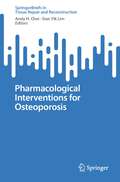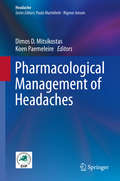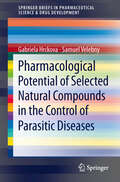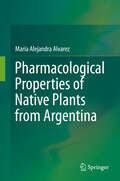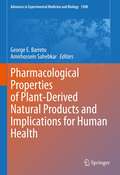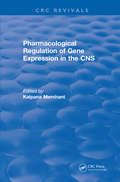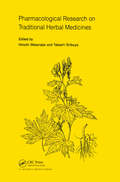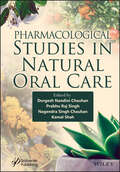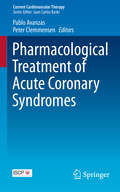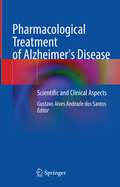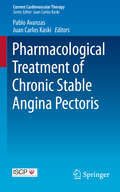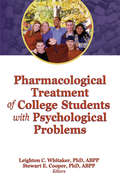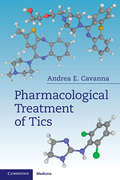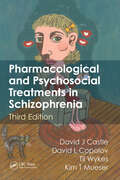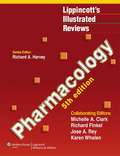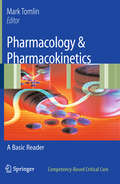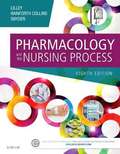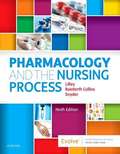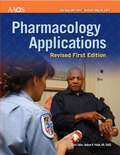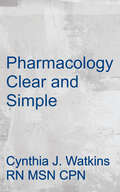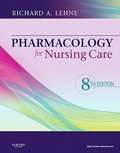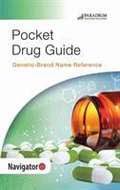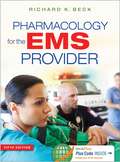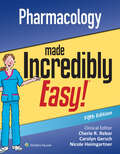- Table View
- List View
Pharmacological Interventions for Osteoporosis (Tissue Repair and Reconstruction)
by Andy H. Choi Sian Yik LimThis book provides readers a fundamental insight into the basic properties of the pharmaceutical agents used in the treatment of osteoporosis. It provides insight into mechanisms of action, updated information on clinical utility, and possible side effects associated with the use of these pharmaceutical agents. In particular, it highlights the use of two monoclonal antibodies romosozumab and denosumab in activating osteoblast differentiation and inhibiting osteoclasts. It also discusses two anabolic pharmaceutical agents, teriparatide and abaloparatide to treat osteoporosis. They have been shown to reduce the incidence of non-vertebral and vertebral fractures significantly after they were administered to patients daily as subcutaneous injections. The content of this book caters to researchers, scientists, and clinical practitioners who are interested in the treatment of osteoporosis using pharmaceutical agents.
Pharmacological Management of Headaches
by Dimos D. Mitsikostas Koen PaemeleireIn this book, headache experts summarize all the currently available therapies for primary headaches and most importantly, describe the 'tricks' that can ensure the success of headache pharmacotherapy. Prevention and acute treatment of migraine and cluster headache receive particular attention and individual chapters are devoted to the treatment of primary headaches in special groups, i. e. children, pregnant women and the elderly. Further chapters focus on selected secondary headache disorders and cranial neuralgias for which pharmacotherapy is available. The book is designed to meet the daily practice needs of general physicians, general neurologists, neurologists in training and medical students. Headache remains a leading reason for people to seek medical consultation, and migraine and other primary headache disorders are classified by the WHO as among the most disabling medical conditions in the general population, often affecting individuals during their most productive years. Unfortunately, under treatment and mismanagement are the fate of many headache patients and this book provides a sound basis for optimizing treatment.
Pharmacological Potential of Selected Natural Compounds in the Control of Parasitic Diseases
by Samuel Velebny Gabriela HrckovaThe natural world with a large number of terrestrial and marine plants and lower organisms is a great source of bioactive compounds historically used as remedies in various diseases. Within the last decade, such compounds became more attractive targets for pharmacologists and the pharmaceutical industry in drug development projects. This volume presents the pharmacological potential of chemically defined natural compounds obtained from plants, fungi, algae and cyanobacteria with antiparasitic activity, that have been tested against various endo-parasitic protozoan and helminth species. Additionally, the advantages of combined therapy using antiparasitic drugs and natural compounds with selected specific activity are reviewed and explained in the context of host pathology and immunosuppression induced by the parasites. The conclusions of this new book give suggestions for further non-empirical drug development and discuss perspectives of alternative approaches to therapy of parasitic diseases.
Pharmacological Properties of Native Plants from Argentina
by María Alejandra AlvarezThe aim of this book is to offer information about the Pharmacological Properties of Native Plants from Argentina to students, researchers and graduates interested in the fields of Ethnobotany, Pharmacognosy, Phytochemistry, Pharmacy, and Medicine. The book includes summary information about the native plants from Argentina with medical activity comprising their botanical characteristics, distribution, characteristics of the regions where they grow, ethnobotanical information, chemical data, biological activity, establishment of in vitro cultures, toxicity, and legal status.
Pharmacological Properties of Plant-Derived Natural Products and Implications for Human Health (Advances in Experimental Medicine and Biology #1308)
by George E. Barreto Amirhossein SahebkarMedicinal plants and their derived products remain as an indispensable source of bioactive molecules that serve as either drug candidates or lead compounds for drug design and discovery. There are several advantages for plant-derived therapeutics including wide availability, diverse pharmacological actions and a generally good profile of safety and tolerability. Over the recent years, there have been numerous reports from clinical studies testifying to the efficacy and safety of medicinal plants and phytochemicals in ameliorating several human diseases. A plethora of basic studies has also unravelled molecular mechanisms underlying the health benefits of herbal medicines. Nevertheless, issues such as identification of bioactive ingredients, standardization of the products and drug interactions remain to be further studied. In this book, we aim to put together several chapters on the medicinal properties and pharmacological action of medicinal plants, plant species and phytochemicals. The goal is to present a comprehensive collection on most of the therapeutic aspects of plant-derived natural products and molecular mechanisms thereof.
Pharmacological Regulation of Gene Expression in the CNS Towards an Understanding of Basal Ganglial Functions (CRC Press Revivals)
by Kalpana MerchantThis book focuses on dopamine-mediated regulation of gene expression within the striatum and associated regions of the central nervous system. It is an excellent review of experimental data on interactions between neuronal systems at systemic, cellular, and molecular levels. Each of the chapters, written by the world's leading scientists, provides an understanding of anatomy, neurochemistry, and cellular and molecular effects. Such an understanding sheds light on the pathophysiology of central disorders involving the basal ganglia and leads to new approaches for the treatment of diseases such as Parkinson's disease and schizophrenia, and also addictions to psychostimulants such as cocaine and amphetamines.
Pharmacological Research on Traditional Herbal Medicines
by Hiroshi WantanabeA concise overview of some of the findings and topics related to the pharmacology and clinical applications of traditional herbal therapeutics. It addresses the current and potential roles for herbal medicine in the context of our evolving health-care systems. Introducing many pharmacological advances made, the work also describes the modern theories and scientific methodologies applied to today's studies on herbal medicines and new drug development.
Pharmacological Studies in Natural Oral Care
by Durgesh Nandini Chauhan Nagendra Singh Chauhan Prabhu Raj Singh Kamal ShahPharmacological Studies in Natural Oral Care Edited by a natural product scientist, clinician, pharmacologist and a dental surgeon, the book helps oral care specialists to implement safe and effective natural medicine therapies to complement current practice guidelines. With oral care specialists focusing their attention on the interdisciplinary connections between oral health, heart health, gastrointestinal health, etc., and with increasing antibiotic resistance and stronger antibiotics now reserved for serious active infection, the importance of herbal antibiotics is increasing exponentially. This book helps to implement safe and effective natural medicine therapies to complement the current practice guidelines. Pharmacological Studies in Natural Oral Care is a comprehensive compilation and explores all the measures to utilize the natural oral care obtained from plants, animals, and mineral drugs for dental care. Herbal extracts are used in dentistry for reducing inflammation, as antimicrobial plaque agents, for preventing the release of histamine, and as antiseptics, antioxidants, antimicrobials, antifungals, antibacterials, antivirals and analgesics. They also aid in healing and are effective in controlling microbial plaque in gingivitis and periodontitis, thereby improving immunity. Audience This important new book will be invaluable to medicinal chemists, pharmacologists, natural product formulation scientists, dental surgeons, orthodontists, periodontists, endodontists, prosthodontists, maxillofacial surgeons, dentists, oral hygienists, as well as a reference for the pharmaceutical/ herbal industries and dental libraries.
Pharmacological Treatment of Acute Coronary Syndromes
by Pablo Avanzas Peter ClemmensenCardiovascular pharmacotherapy is a fast-moving and complex discipline within cardiology in general. New studies, trials and indications are appearing on a regular basis. This series, and this particular title within the series, is designed to establish the baseline level of knowledge that a cardiovascular professional needs to know on a day-to-day basis. The information within is designed to allow readers to learn quickly and with certainty the mode of action, the possible adverse effects, and the management of patients prescribed these drugs. The emphasis is on current practice, but with an eye to the near-future direction of treatment. This book is intended to update clinicians on recent data on the medical management of patients with Acute Coronary Syndromes. Alongside each book in the series, this title has been established to allow rapid publication of new editions to cover developments in the field.
Pharmacological Treatment of Alzheimer's Disease: Scientific and Clinical Aspects
by Gustavo Alves Andrade dos SantosAlzheimer’s disease is the most prevalent form of dementia. Although it was discovered about a century ago, the first drugs applied in treatment were only introduced in therapy in the last 30 years.This book focuses on the clinical pharmacology of drugs that aim to delay the progression of Alzheimer’s disease, such as anticholinesterases and glutamate receptor antagonists, as well as treatment for the behavioral changes caused by the progression of the disease: antidepressants, antipsychotics, anxiolytics, and mood stabilizers.In addition, it describes important information about the pathophysiology and diagnostic methods of Alzheimer’s disease, emergency situations conditioned by the dementia process, and presents new perspectives for the treatment of Alzheimer’s disease. The ten chapters cover topics such as mechanism of action, dosage regimen, adverse reactions, drug interactions, toxicity profiles, among other information of clinical relevance. The work comprises evidence-based studies, providing a valuable resource for analyzing, prescribing and monitoring patients being treated for Alzheimer’s disease.Written by experts with solid professional experience, this book will appeal to pharmacologists, geriatricians, neurologists, psychiatrists, biomedical clinicians, and other healthcare professionals.
Pharmacological Treatment of Chronic Stable Angina Pectoris
by Juan Carlos Kaski Pablo AvanzasThis book is intended for general cardiologists and other physicians involved in the care of patients with chronic stable angina (CSA). The goal of this book is to update clinicians on recent data on the medical management of patients with CSA. Ischemic heart disease remains a major public health problem. Chronic stable angina is the initial manifestation of ischemic heart disease in approximately one half of patients. Stable coronary artery disease is generally characterized by episodes of reversible myocardial demand/supply mismatch, related to ischaemia or hypoxia, which are usually inducible by exercise, emotion or other stress and reproducible--but, which may also be occurring spontaneously. Such episodes of ischaemia/hypoxia are commonly associated with transient chest discomfort (angina pectoris). The aim of the management of CSA is to reduce symptoms and improve prognosis. The management of these patients encompasses lifestyle modification, control of coronary artery disease risk factors, evidence-based pharmacological therapy and patient education. All patients with stable angina should be offered optimal medical treatment, defined as one or two anti-anginal drugs as necessary, plus drugs for secondary prevention of cardiovascular disease. Regarding the role of revascularization, randomised trials provide compelling evidence that myocardial revascularisation by coronary artery bypass grafting or by percutaneous coronary intervention improves symptoms of angina relative to continued medical treatment.
Pharmacological Treatment of College Students with Psychological Problems
by Leighton C. Whitaker Stewart E. CooperGet valuable insights into best practices and procedures for treatment Mental health practitioners across the country are increasingly treating students by combining the use of psychotropic medication with psychotherapy. Pharmacological Treatment of College Students with Psychological Problems explores in detail this uncritically accepted exponential expansion of the practice. Leading psychiatrists, psychologists, and social workers discuss the crucial questions and problems encountered in this widespread practice, and also present specific and differing models of combined therapy. This book critically examines several of the key issues, practices, and competing perspectives. Professionals working in college mental health are provided with valuable insights into best practices and procedures in split and integrated treatment. Various clinicians beyond the psychiatric field are prescribing psychotropic medications with increasing frequency. Pharmacological Treatment of College Students with Psychological Problems presents a wide range of viewpoints on this issue, offering evidence, arguments, and recommendations to clearly illustrate the need for increased attention to the use of psychotropic medications and show how psychotherapy may be safer and more beneficial. Chapters include discussions on withdrawing from medication successfully, long term perturbation effects, and differing models of combined therapy in practice. This resource is comprehensively referenced. Topics in Pharmacological Treatment of College Students with Psychological Problems include: identification of the key issues and practices of combining psychotropic medication with counseling in treatment elements of two separate university counseling centers and how they provide combined treatment emerging research on perturbation effects of use of psychotropic medications best practices in the combined treatment in college settings key unresolved questions that need further research bringing a more sophisticated level in the practice of combined treatment with college students Pharmacological Treatment of College Students with Psychological Problems is a valuable resource for all professionals from seasoned professionals to beginning practicum students.
Pharmacological Treatment of Tics
by Andrea E. CavannaProviding an overview of the assessment, diagnosis, and pharmacological treatment of tics, this is a practical handbook designed for use in busy clinics by trainees and practitioners in a range of disciplines. The most widely used pharmacological treatment options for tics are covered, including first- and second-generation antidopaminergic medications, alpha-2 adrenergic medications, and other tic-suppressing medications. Particular care has been taken in covering the key medications used for tic control, detailing information such as the main pharmacodynamic and pharmacokinetic properties, tolerability profiles, clinically relevant interactions, and recommendations for use in special populations. International guidelines on the pharmacotherapy of tics are defined, with further reading lists of up-to-date literature supporting the reader in developing their knowledge. Delivering evidence-based applied guidance for the assessment and pharmacological treatment of tics, this is an essential manual for clinicians.
Pharmacological and Psychosocial Treatments in Schizophrenia
by David J. Castle Kim T. Mueser Til Wykes David L. CopolovPharmacological and Psychosocial Treatments in Schizophrenia provides a succinct clinical overview of key areas pertinent to the holistic treatment of people with schizophrenia and, in particular, puts firmly back onto the agenda the importance of psychosocial treatments.The latest data concerning the newer antipsychotic agents and clinical guidelines for their use are reviewed. The real emphasis, however, is on the psychosocial interventions for specific aspects of schizophrenia symptomatology and disability that have been shown to offer major benefits to recovery in the disorder, and yet have failed to have a high profile in the literature, as more effective biological treatments have become available.This book offers practical guidance on effective strategies for use in both clinical settings and in the family context, placing the patient (and their family) once again at the centre of therapeutic endeavours. Encouraging professionals to offer a broader therapeutic approach, this book will offer real hope to therapists, patients and families of what can be achieved if psychosocial interventions complement the many psychopharmacological treatments available today.Key topics include: female patients, treatment resistance, the substance abuser patient, family intervention, helping the patient at work, managing violent behaviour, first episode psychosis and rating scales in schizophrenia.
Pharmacology
by Richard A. Harvey Michelle A. Clark Richard Finkel Jose A. Rey Karen WhalenLippincott's Illustrated Reviews: Pharmacology, Fifth Edition enables rapid review and assimilation of complex information and focuses on the essentials of medical pharmacology. Clear, sequential pictures present mechanisms of action and actually show, rather than tell, students how drugs work. This book features a signature outline format with more than 500 full-color illustrations and cross-references to other volumes in this bestselling, student-oriented series.
Pharmacology & Pharmacokinetics
by Mark TomlinEffective drug administration is a crucial skill for any practitioner working in the critical care unit. This book, in providing a concise account of the fundamental principles of pharmacology and pharmacokinetics, equips the critical care physician for such a task. In addition to the principles of pharmacology and pharmacokinetics, this volume alerts the reader to factors that affect drug action such as disease, pregnancy and age, and advises on how to adjust drug dosages accordingly. The specialist therapeutics covered comprise drugs targeting the gastro-intestinal tract, sedation, non-opioid analgesia and opiates. A quick and easy reference, this volume will prove a valuable asset for both trainees and fully qualified practitioners in critical care.
Pharmacology And The Nursing Process
by Linda Lane Lilley Shelly Rainforth Collins Julie S. SnyderLet this outstanding pharmacology text help you learn how to administer drugs safely and effectively! Now in its eighth edition, Pharmacology and the Nursing Process continues to deliver the perfect amount of pharmacology, prioritization, and nursing process information to today''s nursing students. Centering on its unique key drug approach, this text focuses only on the drug information you need to safely administer drugs. The text also continues to emphasize the nursing process and prioritization, covering the most essential assessments, nursing diagnoses, interventions, and evaluations you need to practice effectively. New to this edition is even more coverage of QSEN competencies, simpler language, and a wealth of reader-friendly features and innovative learning aids. Along with its integrated NCLEX preparation and insightful learning strategies, you won''t find a more complete pharmacology text on the market!
Pharmacology And the Nursing Process
by Linda Lane Lilley; Shelly Rainforth Collins; Julie S. SnyderPharmacology and the Nursing Process focuses on the key information you need to safely and effectively administer medications. The 9th Edition features clearly written updated drug content reflecting the latest FDA drug approvals, withdrawals, and therapeutic uses. Hundreds of full-color illustrations detail how drugs work in the body and depict key steps in administration.
Pharmacology Applications: Revised First Edition
by American Academy of Orthopaedic Surgeons (AAOS)Pharmacologic intervention is a cornerstone of paramedic treatment. Pharmacology Applications, Revised First Edition covers the relevant issues of pharmacology as they relate to the field practice of the paramedic. The text gives students a comprehensive understanding of the indications, contraindications, and side effects of medications, as well as insight into the pathophysiology and etiology of conditions requiring rapid pharmacologic intervention. Important Notice: The digital edition of this book is missing some of the images or content found in the physical edition.
Pharmacology Clear And Simple: A Guide To Drug Classifications And Dosage Calculations
by F.A. Davis Company Cynthia J. WatkinsHalf pharmacology, half dosage calculations —plus an intensive, yet clear & simple review of basic math and online quizzing! Here’s the must-have knowledge and guidance you need to gain a solid understanding of pharmacology and the safe administration of medications in one text. A body systems approach to pharmacology with a basic math review and a focus on drug classifications prepare you to administer specific drugs in the clinical setting. Now with online Q&A practice in Davis Edge! Purchase a new, print copy of the text and receive a FREE, 3-year subscription to Davis Edge, the online Q&A program with 1,600 questions in all, 800 for Medical Assisting and 800 for Nursing. Davis Edge helps you to create quizzes in the content areas you choose to focus on, build simulated practice exams, and track your progress every step of the way.
Pharmacology For Nursing Care
by Richard A. LehneA favorite among nursing students, Pharmacology for Nursing Care, 8th Edition, features a uniquely engaging writing style, clear explanations, and unmatched clinical precision and currency to help you gain a solid understanding of key drugs and their implications -- as opposed to just memorization of certain facts. Compelling features such as a drug prototype approach, use of large and small print to distinguish need-to-know versus nice-to-know content, and a focus on major nursing implications save you study time by directing your attention on the most important, need-to-know information. The new edition also features an abundance of content updates to keep you ahead of the curve in school and in professional practice. UNIQUE! Engaging writing style with clear explanations makes content easy to grasp and even enjoyable to learn. A drug prototype approach uses one drug within each drug family to characterize all members of its group to help you learn about related drugs currently on the market and drugs that will be released once you begin practice. UNIQUE! Special Interest Topic boxes address timely issues in pharmacology and connect pharmacology content with current trends. Large print/small print design distinguishes essential "need-to-know" information from "nice-to-know" information. Limited discussion of adverse effects and drug interactions keeps your limited study time focused on only the most clinically important information. Reliance on up-to-date evidence-based clinical guidelines ensures that therapeutic uses are clinically relevant. Integrated and summarized nursing content demonstrates the vital interplay between drug therapy and nursing care. Coverage of dietary supplements and herbal interactions equips you to alert patients and caregivers to the potential dangers of certain dietary supplements, including interactions with prescribed and over-the-counter drugs and herbal therapies. Additional learning features provide a touchstone for study and review as you complete reading assignments and build a foundation of pharmacologic knowledge. Updated drug content and related nursing content reflect the very latest FDA drug approvals, withdrawals, and evidence-based therapeutic uses. Expanded and updated content on medication safety prepares you to pass the NCLEX Examination and practice safe medication administration in the clinical setting. Expanded coverage of pharmacogenomics introduces you to the many different genetic factors that influence drug therapy
Pharmacology For Technicians: Paradigm's Pocket Drug Guide
by Don A. Ballington Mary M. Laughlin Skye McKennon<P>As the most in-depth pharmacology text designed specifically for pharmacy technicians, this title prepares students for a career in community, institutional, and other pharmacy settings.<P> Students will develop a basic understanding of drug classes and the mechanisms of action for many drugs. <P>They will also gain insight into why certain drugs are prescribed for particular disease states and obtain instruction for making informed, intelligent decisions when dispensing drugs.<P> Includes an all-new drug guide and workbook, available in print or digitally.
Pharmacology For The EMS Provider (Fifth Edition)
by Richard K. BeckDesigned for learning success. Overcome your fears and build your confidence while you master the mathematic and pharmacology knowledge you need to pass your licensure exams and prepare for professional practice. The 5th Edition of this popular resource presents often complex information is an way that's easy to understand and easy to follow, emphasizing the relevance of the drug information to your work as a paramedic as well as the calculations required to safely administer the correct drug dosages. Access more online. Redeem the Plus Code inside new, printed texts to access a wealth of resources online at DavisPlus. You'll find your Davis Digital Version, your complete text online, study questions, and fifteen animated learning modules that show you how drugs work. "Good book. " "This book is VERY helpful! I found that it breaks the math down and makes it very simple and easy to follow! I recommend this book to anyone going through Paramedic School!"--Kimberly Wright, review of a previous edition
Pharmacology Made Incredibly Easy (Incredibly Easy! Series®)
by Cherie R. Rebar Nicole M. Heimgartner Carolyn GerschReady to master the medication process? Tap into the go-to resource for nursing pharmacology basics, with the fully updated new fifth edition of Pharmacology Made Incredibly Easy!®.Offering clear, concise descriptions of crucial nursing pharmacology concepts and procedures, this easy-to-follow, colorfully illustrated guide offers step-by-step guidance so to can grasp the fundamentals in enjoyable Incredibly Easy style. From initial assessment to safe medication administration and patient care plans, this is the perfect supplement to class materials, offering solid preparation for NCLEX®, as well as a handy refresher for experienced nurses.
